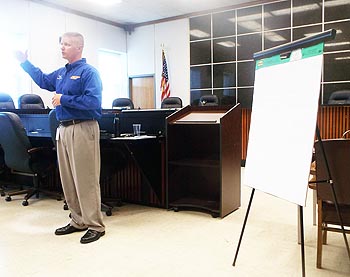AC Mayor and ACEMS director host public info session on ACEMS

Anderson County Emergency Medical Services Director Nathan Sweet is shown answering citizens’ questions about the department’s operations in a public information session Sweet and Anderson County Mayor Terry Frank hosted last week in the Anderson County Courthouse in Clinton.
Financial burdens continue to plague ACEMS.
For months, county officials have been trying to figure out how to fund the department going forward. As the 2016-2017 budget cycle nears an end, commissioners are preparing to balance the upcoming fiscal year’s budget.
ACEMS is one of the departments expected to face some major budget cuts.
Last week, Anderson County Mayor Terry Frank and Anderson County Emergency Service (ACEMS) Director Nathan Sweet hosted a public information session on Wednesday, May 24, at 5:30 p.m. in the Anderson County Courthouse in Clinton to answer questions from the public about how EMS is funded, to discuss its current and future challenges, and its goals in meeting the needs and expectations of Anderson County citizens.
“We thought there would be a benefit in offering the public an opportunity to ask any questions,” Frank said.
During last month’s county commissioner’s meeting, commissioners voted 14-0 to approve a request for proposal (RFP) to initiate a comprehensive operational audit of the ACEMS department, with the goal being to look for additional ways to cut costs, and operate the department with more efficiency.
At that same meeting, commissioners voted 10-4 not to increase ambulance rates. The vote not to increase leaves the department scrambling to come up with more ways to reduce its budget for the upcoming fiscal year.
Sweet explained that without a rate increase ACEMS will be making some major cuts to its budget, some of those being personnel cuts.
ACEMS is manned by 64 full-time and 20 part-time staff. The part-time staff the department employs cuts down on overtime pay.
Changes in federal and state healthcare laws, increases in Medicare recipients, problems with its third-party billing company, and the switch a few years ago to operating an enterprise fund, have all combined to create a perfect storm for a negative impact on the EMS budget.
Frank and Sweet provided a brief overview of the department, and the problems leading up to its financial woes.
This meeting makes the second time in nearly a year ACEMS has hosted a public information session to discuss its budgetary problems.
Sweet hosted a “State of the EMS” briefing in June of last year, where he explained to elected officials and the rest of the public what have been some of the sources of the department’s revenue problems.
Sweet also apprised officials at that meeting that ACEMS had recently switched to a new billing company due to problems they encountered dealing with their prior billing company. With the switch to a new billing company, Sweet said he hoped it would clear up some of the funding issues they encountered with billing.
According to county officials, ACEMS used to do its billing in-house, but several years ago decided to outsource its billing.
Commission has also made another significant change to the way the EMS department operates. In April, Commission voted at its monthly meeting to move the department’s budget from an enterprise fund to a special revenue fund, giving the county’s finance committee more discretion in overseeing the department’s operating expenses and less oversight from the mayor who is over the department.
Frank still has oversight of the department, but the finance committee will have more input, officials said.
In 2010, once the county put the ACEMS budget as an enterprise fund, the county started charging EMS for costs the government provided the department to help run that department.
An enterprise fund is treated like a business, which means every cost associated with the business is charged to the department. This meant the department had to start paying the county back for different costs, said Frank.
“Your regular government saw a business enterprise as a way to recoup funds for the system,” she said. “No other EMS system in the state is under a 205 or a business fund. The issue with EMS are the revenues. It’s the revenue side we’re having trouble with, and particularly the payer mix.”

